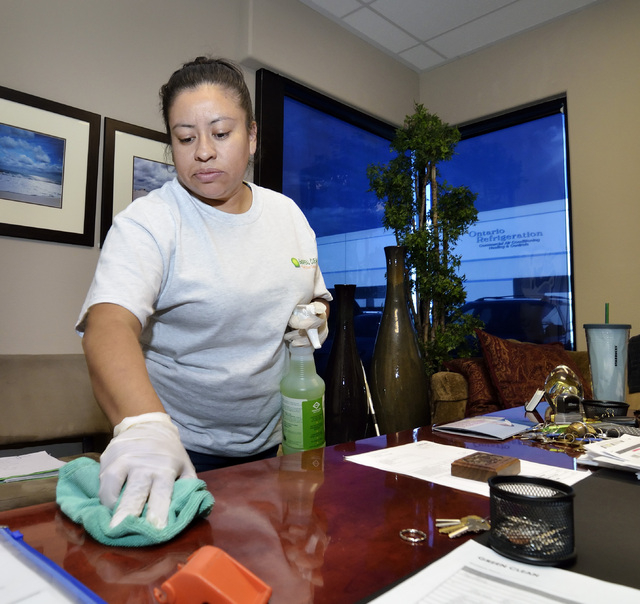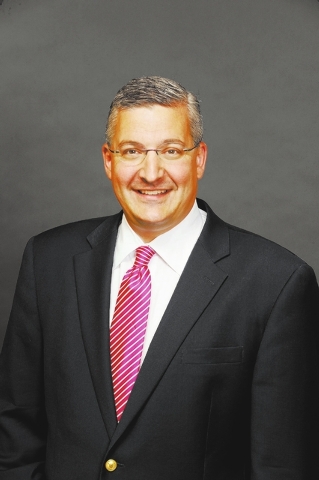Small businesses watching Washington for clues on economy’s future
Federal lawmakers have left quite a mess to mop up.
And it’s going to fall partly on small-business owners such as Perry Dau to clear the debris left in the wake of the two-week federal shutdown. The problem is, Dau, owner of Green Clean Commercial Cleaning Services, says he and the big companies he serves aren’t in a position to help just yet, thanks to the uncertainty Washington’s creating these days.
“Large companies are doing as little as possible to minimize their risk until they know what lies ahead, and we rely on big business for the majority of our accounts,” Dau said. “That’s important revenue for us. So I think, like most people, we’re kind of going to wait and see if our government is going to start doing their job and help get things figured out so we can go in some direction.”
Two new surveys show Dau’s not alone. A national small-business trade group and a nationwide payroll-services company both reported waning optimism among entrepreneurs, and they say hiring is suffering as a result of that bleaker outlook.
That’s an especially ominous trend in Nevada, where companies with fewer than 100 workers employ more than half of the workforce. If small-business owners are nervous about the future, that could affect their willingness to hire or expand.
Here’s what the surveys say.
The National Federation of Independent Business found a 2-point drop in optimism levels among its members from August to September, and an average drop of 0.1 workers per firm in the same period. Just 8 percent of members called it a good time to expand.
And although the shutdown didn’t begin until Oct. 1, the threats and the blaming started early enough to make a difference, said Randi Thompson, Nevada director of the federation.
“It was the posturing of it all. For business owners, optimism these days is directly tied to their confidence in the government,” Thompson said. “And there’s very little to be confident about when you’ve got people in Washington talking the way they were talking in September. The dysfunction is affecting all citizens, but it’s especially disconcerting to anyone trying to run a business. Their antics are impacting the economy.”
Michael Alter, president of Illinois-based payroll processor SurePayroll, agreed the federal breakdown worried small-business owners.
“There was — and still is — a tremendous amount of uncertainty around what was going to happen with the government and the debt ceiling in September, and that drove a lot of people to sort of freeze and sit on the sidelines. They don’t know what their world is going to look like,” Alter said.
That’s why SurePayroll’s Small Business Scorecard showed a big drop in optimism nationwide, with 59 percent of owners of businesses with fewer than 100 people saying in September that they felt good about the future of the economy. That was down from 72 percent in August.
And like the National Federation of Independent Business, SurePayroll’s analysis showed a drop in staff sizes: The company’s small-business hiring index for Las Vegas fell 1.4 percent from August to September, and 7.7 percent year over year in September. Nationally, hiring was flat month to month, and off 1.7 percent year to year.
It’s not just the shutdown that’s hurting enthusiasm.
The Affordable Care Act, or Obamacare, has long created uncertainty among smaller firms. Even for companies that can avoid the employer coverage mandate because they have fewer than 50 employees, there are issues: Their employees and customers need to be insured, and that could hurt incomes available to spend with their business, Alter said.
“In the short term, at least, the uncertainty slows everything down. You invest in the must-haves, not the wants,” Alter said. “Maybe you don’t lease that extra delivery truck, buy that second machine for your warehouse or hire an extra full-time worker to help out. And when small companies delay capital investments, it dampens long-term recovery, because capital investments have longer ramp-ups and benefits.”
Dau said he’s also worried about the potential for new business taxes in Nevada, although he added that he thinks the overall local economy is improving.
So does Kevin Pentony, a principal in OGI Environmental Consultants, a Las Vegas firm that evaluates property conditions and cleans up building sites. The company cut two of its seven positions in the recession, and pared hours for its remaining five workers. Things aren’t quite back where they were before the downturn, but OGI’s employees all have full-time work again, Pentony said.
Still, Pentony’s not ready to hire. The company isn’t busy enough to justify more people, and clients aren’t yet flush enough to pay pre-recession fees despite gains in business. What’s more, the Affordable Care Act could be a “significant consideration” as to whether he adds employees, he said. Although it doesn’t have to under the new law, OGI pays 100 percent of its workers’ insurance premiums, and if those costs rise, that could affect expansion plans.
Nor is James Simmons looking to bring on employees. Simmons, owner of Spectrum Color Printing, launched his company in 2007, as the recession was beginning. He managed to grow revenue each year — until now. He blames the current economic malaise on short housing supplies, because housing sales are an important driver of Southern Nevada’s economy.
“I’m going to wait and see,” he said. “I don’t see any end to where I’m at now, but if sales come back to increase in the 25 to 30 percent range, I would have to hire.”
For the fourth quarter, at least, Simmons and other companies shouldn’t count on dramatic improvements in the economy, Thompson said. Tourism-reliant Las Vegas suffered through the first two weeks of October with its national parks closed, and contractors who work with federal agencies such as the Defense Department took a hit. And all that came in a state that already had the highest unemployment and foreclosure rates in the country, Thompson said.
“You’re going right to the basics of security. People want to make money and have a safe place to live. Safety and security are the core needs of people, and if you take those two things away, you get this perpetuation of economic malaise,” she said.
It’s not all bad, though.
Some companies will have to hire as they grow. That’s the case at Green Clean, where Dau said he’s more focused on keeping his business in order than he is on the disarray in Washington.
“I don’t have the luxury not to hire,” he said. “I hire when I need people. Any of these big issues can affect business negatively. But those are things I can’t control, and honestly, I’m tired of worrying about them.”
Contact reporter Jennifer Robison at jrobison@reviewjournal.com. Follow @J_Robison1 on Twitter.




















